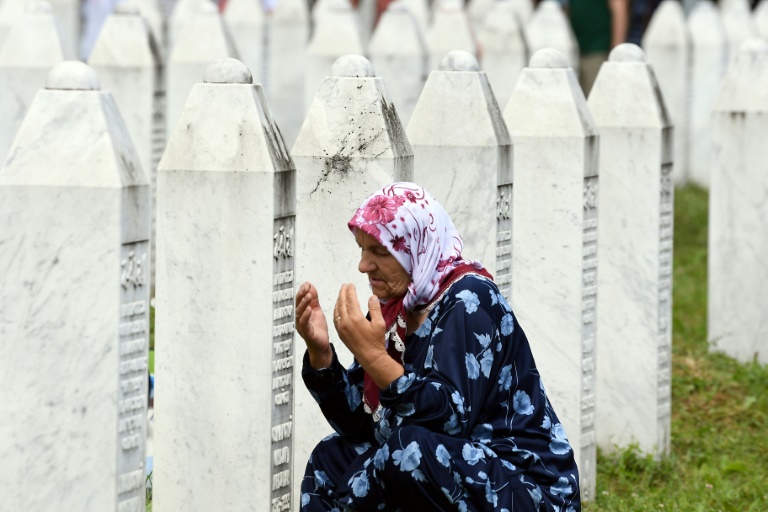Thousands of solemn mourners gathered in the Bosnian town of Srebrenica on Thursday to commemorate the 1995 massacre of Bosnian Muslims. The United Nations had established a day of remembrance less than two months ago to commemorate the genocide.
On July 11, 1995, Bosnian Serb forces seized the eastern Bosnian city, then a UN-protected enclave, and in the days that followed, they massacred 8,000 Muslim men and boys.
It was the worst massacre in Europe since World War II and two international courts ruled that it amounted to genocide.
“It is difficult when July comes. They ended up like this because they had a (Muslim) name,” said Mevlida Hasanovic as she prayed at the grave of her cousin, who was 18 when he was killed.
Hasanovic lost a dozen male relatives in the massacre, including her father and husband. Their graves lie next to her cousin’s.
His remains were buried twice, as they were found in two different mass graves.
The 54-year-old woman is still waiting for “at least one bone” of her brother to be found so she can bury him, she told AFP.
“Their souls know that we are here next to them. When I arrive here, it feels like we were separated in Srebrenica,” she said.
In May, the UN General Assembly adopted a resolution declaring July 11 the International Day of Reflection and Commemoration of the Srebrenica Genocide of 1995.
The resolution was fiercely opposed by Serbia and Bosnian Serbs, who continue to downplay the crime.
Bosnian Serb leader Milorad Dodik has repeatedly denied that genocide took place and says his government will not recognize the resolution.
But Dodik expressed his condolences to the families of the victims on Thursday.
“Regardless of our differences, we must show respect for the pain and suffering that has befallen many people of all countries and religions in Bosnia and Herzegovina,” Dodik said on X.
A UN court has sentenced Bosnian Serb war leader Radovan Karadzic and his army chief Ratko Mladic to life imprisonment for war crimes including the genocide in Srebrenica.
The war in Bosnia between 1992 and 1995 between Croats, Muslims and Serbs cost the lives of about 100,000 people.
Nearly thirty years after the end of the war, the Balkan country remains deeply divided along ethnic lines.
– ‘He cried’ –
On Thursday, the remains of another 14 victims of the massacre, including a 17-year-old boy, will be buried at a cemetery in Potocari, just outside Srebrenica.
Beriz Mujic, whose remains were found last year in the Srebrenica region, will be buried next to his brother Hazim.
The remains of 6,988 Srebrenica victims are buried, most of them under white gravestones in Potocari.
The remains were found in 87 mass graves and a spokeswoman for Bosnia’s missing persons institute told AFP they were still searching for about 1,000 people.
To cover up the crime, Bosnian Serb forces moved the victims’ bodies to so-called secondary mass graves.
Kada Sikovic, accompanied by her two daughters and son, stood by the coffin of her husband Musan, with tears streaming down her face.
Parts of his chin bone were recovered in 2010, but she refused to hold a burial ceremony until more remains were found last year.
“Luckily we found some of his bones,” she told AFP.
She remembers the painful moment when the family was separated in Srebrenica in 1995.
“He cried, kissed the girl (daughter), took the little son (five years old) in his arms and said: ‘Goodbye’.”
The European Union, which Bosnia wants to join, called the atrocity on Wednesday “one of the darkest moments in modern European history”.
“There is no place among us for people who deny genocide, try to rewrite history and glorify war criminals,” EU foreign policy chief Josep Borrell and EU enlargement commissioner Oliver Varhelyi said in a joint statement.
Russian/LJV







